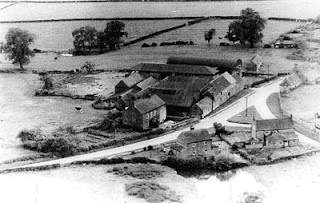 |
| A hidden past ... Flaxby has an interesting story to tell as its history group is finding out. Photo taken 1952. |
The evening started with Kathryn White talking about Flaxby village’s Iron Age homestead, later occupied by Romans, which was excavated by archaeologists in 1994. The village name is Scandinavian in origin and has an entry in the Domesday Book. Since the Norman conquest, the village and surrounding land were part of the Allerton Mauleverer and Goldsborough estates until the mid 20th century when they were were split up and sold.
Sue Munden presented her research into the village's census returns from 1841 to 1911 with particular reference to the Young family, where they came from, occupations, the many children they produced and many interesting facts about their lives.
NEW LINKS
Eleanor Hewitt talked about the group’s newly-established links with other keen historians in Coneythorpe and Marton cum Grafton, and archaeological groups. A map of 1772 has come to light that shows a Roman road called Rickemeld Street which ran north-south passing close to Kirby Hill, Roecliffe, Minskip, Arkendale, Coneythorpe, Flaxby, Goldsborough and Ribston, and there is much interest in the possibility of a joint community project that could secure grants to enable archaeologists to search for this road and find Roman remains.
Eleanor Hewitt talked about the group’s newly-established links with other keen historians in Coneythorpe and Marton cum Grafton, and archaeological groups. A map of 1772 has come to light that shows a Roman road called Rickemeld Street which ran north-south passing close to Kirby Hill, Roecliffe, Minskip, Arkendale, Coneythorpe, Flaxby, Goldsborough and Ribston, and there is much interest in the possibility of a joint community project that could secure grants to enable archaeologists to search for this road and find Roman remains.
Buck White rounded off the evening by discussing future plans. Maps and publications on display were provided by Sheelagh Fowler.
The group is keen to hear expesssions of interest from local enthusiasts. Anyone interested should get in touch by emailing flaxbyhistory@gmail.com.
The group is keen to hear expesssions of interest from local enthusiasts. Anyone interested should get in touch by emailing flaxbyhistory@gmail.com.
The group says that further research is required before a more complete picture of the village history can be presented.
15 November 2014
15 November 2014
I was born in Flaxby,14th july 1952 in the Bar cottage,my name is john Balme.
ReplyDelete